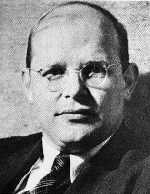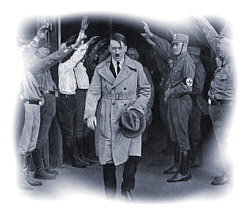|
restoring our biblical and constitutional foundations
|
The Travails of a Lonely Resister
Lessons on Statism from the Life of Dietrich Bonhoeffer
“Unser Christsein wird heute nur in zweierlei bestehen: im Beten und im Tun des Gerechten unter den Menschen.” D. Bonhoeffer, May 1944
I have always been
fascinated—and put to shame—by the courageous example of the young German
theologian
 Dietrich
Bonhoeffer (1906-1945). Our life paths have been similar in some respects.
He belonged to a music-loving
family and enjoyed athletics. He had a talent for learning foreign
languages and took an early interest in theology. He was blessed with a
good university education (his was Tübingen, mine Basel). He traveled
widely. In fact, it was during a visit to Libya that he was confronted for
the first time with the brutal logic and incomprehensibility of war. The
decision to pursue a theological career was not an easy one for him, but
it was always his relationship with God that gave him the most joy and
satisfaction in life.
Dietrich
Bonhoeffer (1906-1945). Our life paths have been similar in some respects.
He belonged to a music-loving
family and enjoyed athletics. He had a talent for learning foreign
languages and took an early interest in theology. He was blessed with a
good university education (his was Tübingen, mine Basel). He traveled
widely. In fact, it was during a visit to Libya that he was confronted for
the first time with the brutal logic and incomprehensibility of war. The
decision to pursue a theological career was not an easy one for him, but
it was always his relationship with God that gave him the most joy and
satisfaction in life.
There the similarities end. Bonhoeffer is justly remembered not only as one of the greatest theologians of the twentieth century but also as a courageous individual of faith. For participating in the conspiracy to kill Adolf Hitler, Dietrich Bonhoeffer was executed by the Nazis at Flössenburg Concentration Camp in the last month of World War II. He had been arrested two years earlier for helping 14 Jews escape to Switzerland.
What led him to risk it all?
Few would have thought that the Nationalsozialistische Deutsche Arbeiter-Partie, starting as a gang of unemployed soldiers in 1919, would become the legal government of Germany by 1933. In fourteen short years, Adolf Hitler, a once obscure corporal, would become the Chancellor of Germany.
World War I had
ended in 1918 with a total of 37 million casualties, including nine
million dead combatants. German propaganda had ill prepared the nation for
defeat, resulting in a sense of injured national pride. The military and
political leaders who were responsible for the defeat claimed that Germany
had been “stabbed in the back” by its leftwing politicians, Communists,
and Jews. When the Weimar
Republic tried to establish a
democratic course, political parties from both the right and the left
struggled for control, at times violently. The new regime could handle
neither the depressed economy nor the rampant lawlessness. Into this void appeared Hitler and
the Nazi Party, promising to right all wrongs and reestablish Germany as a great national power.
economy nor the rampant lawlessness. Into this void appeared Hitler and
the Nazi Party, promising to right all wrongs and reestablish Germany as a great national power.
In an excellent discussion, Professor Michael Moeller shows how Bonhoeffer’s religious contemporaries succumbed to the delusion that the church had to be ushered into Nazism. As Moeller puts it, “To speak against what was regarded as a proper Germanization of the church evoked passionate opposition in a time when the majority of the populace was drunk with nationalism.” For Bonhoeffer, however, the Gospel could never be found in worldly ideologies.
On May 28, 1933, Bonhoeffer preached a sermon in the Kaiser Wilhelm Memorial Church in Berlin. The Nazis had just seized power and were tightening their grip on the nation. Political developments happened quickly in the first five months of Nazi rule in Germany. As Moeller has shown, the Nazi takeover was a textbook example of a revolutionary movement’s successful exploitation of an unstable situation to consolidate its power. The chronology of events may be summarized as follows:
January 30, 1933: Hitler sworn in as Chancellor of Germany.
February 27, 1933: The Reichstag set on fire.
February 28, 1933: A State of Emergency proclaimed.
March 23, 1933: “Law for Removing the Distress of People and Reich” (“Enabling Act”) enacted. Legislative power transferred to the Executive.
April 7, 1933: “Law to Harmonize the State Governments and National Authority” enacted and the federal structure dissolved.
The “Enabling Act” curtailed the constitutional freedoms of Germans, based on peril to the homeland, with a promise that they would be fully restored in four years. The German parliament, which was similar to our U.S. House and Senate, was also promised that the new powers used would be only those “essential for carrying out vitally necessary measures” for the protection of the state and people, and that the “recourse to such a law [would be] in itself a limited one.”
In bringing about these sweeping changes, the Nazi government enjoyed broad support from the public. After the chaotic end of the twenties and Germany’s terrible economic crisis, it seemed that national pride was finally possible again. Law and order had been restored. Hitler was regarded by many as the new Führer (leader) who would bring Germany out of the chaos of the Weimar republic and create a stable society.
As Moeller and others have noted, Hitler’s rapid ascendancy was greeted with enthusiasm by church leaders who felt that the radical change in the nation’s political system should also take place in the church. If the new Germany needed a new leader, the church also needed a new Reichsbishof (national bishop) to usher it into the new era. The party working for the Nazification of the church called itself the Deutsche Christen (German Christians). In a now famous photo, German Christians are shown marching to a worship service at the Berlin Cathedral while SS guards stand at attention. Bonhoeffer, now an ordained pastor, immediately distanced himself from the German Christians and their program. Believing that the church had taken on the form of paganism, some Protestant Christians issued the Barmen Declaration to protest the theological claims of the Nazis. Among its authors was the famous Swiss theologian Karl Barth.
In his sermon of May 28, 1933, Bonhoeffer addresses the changes being advocated by the German Christians. Basing his sermon on the story of the Golden Calf in Exodus 32, Bonhoeffer distinguishes between the church of Aaron and the church of Moses. The church of Aaron, he says, is the church of this world. It answers the demands of humans by encouraging them to go their own selfish ways. The Aaron church asks for sacrifices, but the sacrifices themselves are self-serving. The Aaron church is the church of idols and will ultimately be destroyed by God, because “in the cross all making of gods, all idolatry comes to an end. The whole of humanity, the whole church is judged and pardoned. Here God is God.”
Clearly, the struggle of the German church was uppermost in Bonhoeffer’s thinking. The statist fervor of the German Christians impelled him to say that the true church must constantly defend itself against idolatry. Long before the excesses of the Third Reich forced Bonhoeffer to join the political resistance, acceptance by the German Christians of Nazi ideology had driven him into a state of protest against the church in which they were so dominant.
What, then, was the role of the pastor for Bonhoeffer? And what is the responsibility of church leaders today? Moeller, who carefully studied this issue, concluded: “The pastor has to speak the truth. Not the truth of ideologies, but the truth of the Gospel which the world does not like to hear. The role of the pastor is not to be the master of ceremonies for the world celebrating itself. The role of the pastor might be more the role of the fool, the one who is set aside to speak the truth even though nobody really wants to hear it.”
Bonhoeffer’s decision to join the plot against Hitler wasn’t an easy one. But his realization that the truth requires suffering enabled him to take the fateful step. “I believe that God can and wants to create good out of everything, even evil,” he said. “For that he needs people who use everything for the best. I believe that God provides us with as much strength to resist in every calamity as we need. But he does not give it in advance, so that we trust him alone. In such a trust all anxiety about the future must be overcome.”
February 6, 2003
David Alan Black is the editor of www.daveblackonline.com.